
Passionate Abolitionist and
Witness to the American Civil War


Passionate Abolitionist and
Witness to the American Civil War

Many significant events had taken place in the civil war since the previous letter in this collection. The rebels had achieved victories over the North and were within 100 miles of where Thomas Jackson was living and conducting his business.
He vividly describes the urgent and detailed preparations for war that people in his town undertook.
“In 4 days the state turned out 80 thousand armed & organized men, who were all at and beyond Harrisburg in a week & before the rebels reached our border line”
Two of his workers were in the Union army fighting nearby and one was killed. TJ describes the body coming home and the funeral processions that were increasingly common throughout the country.
TJ reflects that “The history of the white man in America, is one long tale of terrible outrage & murderous cruelty and oppression of other races of men.” And compares the oppression of the Negroes with that of the Indians.
He regrets that “unfortunately in a democracy, that reading thinking, intelligent & reflecting portion of the people are not a majority of the voters.”
“The fact is, the great majority of the American people seem disposed to suffer every thing, sacrifice every thing, honour, honesty, reputation, and all safety & Security for their own best interests and dearest rights; rather than acknowledge that the poor negro has an equal right to liberty with themselves, or that he has any rights at all they are bound to respect.”
The economy has now revived and is doing well in the North. However, in the “slave states” according to TJ, they are short of tea, coffee, salt sugar & clothing & are cut off from all foreign trade.
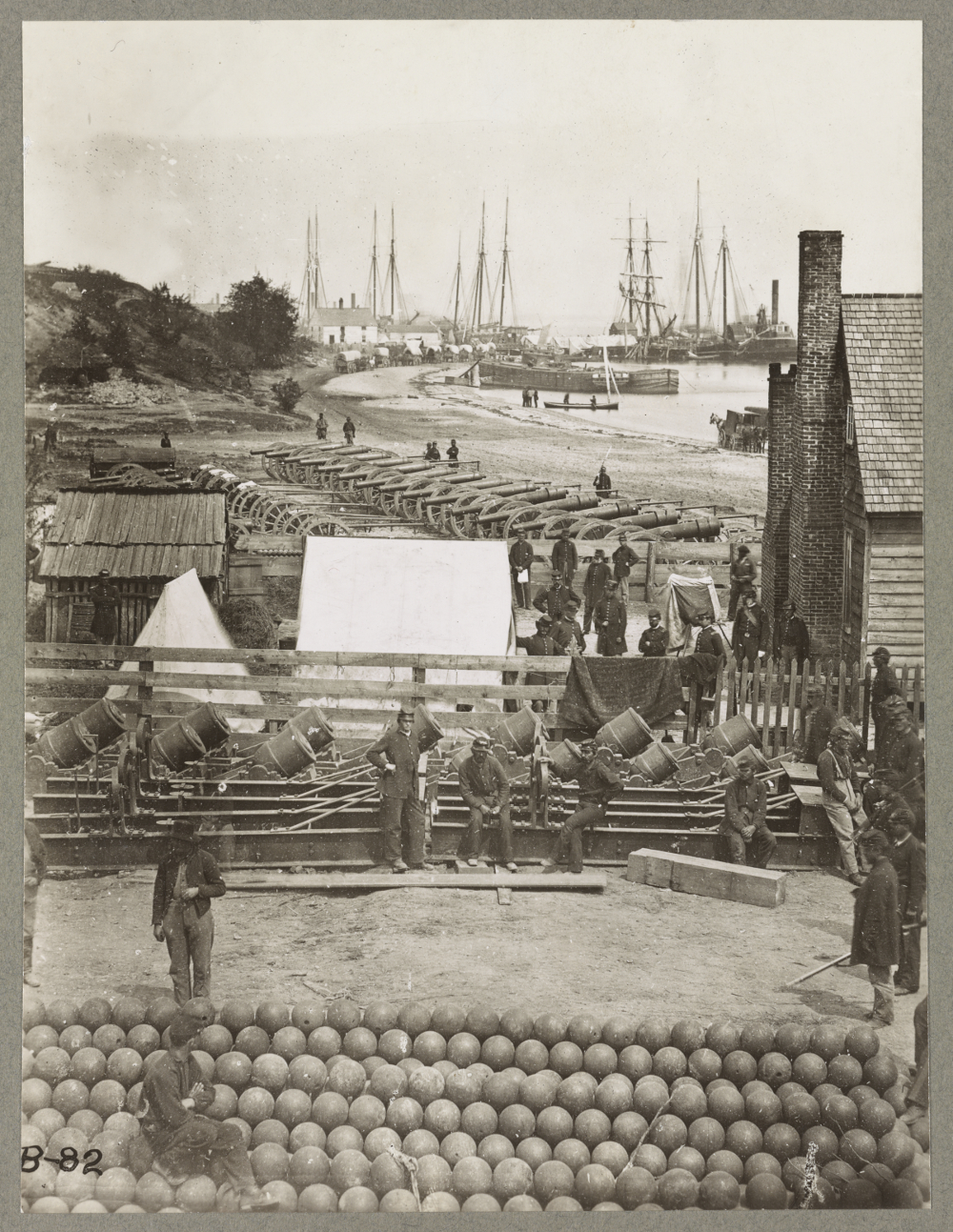
Preparations for War near Yorktown, VA 1862
Detailed view of the cannons, cannon balls, horses and wagons offloaded by Union forces from their ships and readied for attacking Yorktown. McClellan’s Union army set out westerly up the peninsular towards the confederate capital of Richmond, VA. On April 3, he encountered Magruder’s small confederate force at Yorktown. McClellan had the far larger force but he was outsmarted and lost his opportunity to overcome the resistance. Instead, he delayed advancing while he planned a massive bombardment for dawn May 5. By that time the confederate army had slipped away two nights earlier.
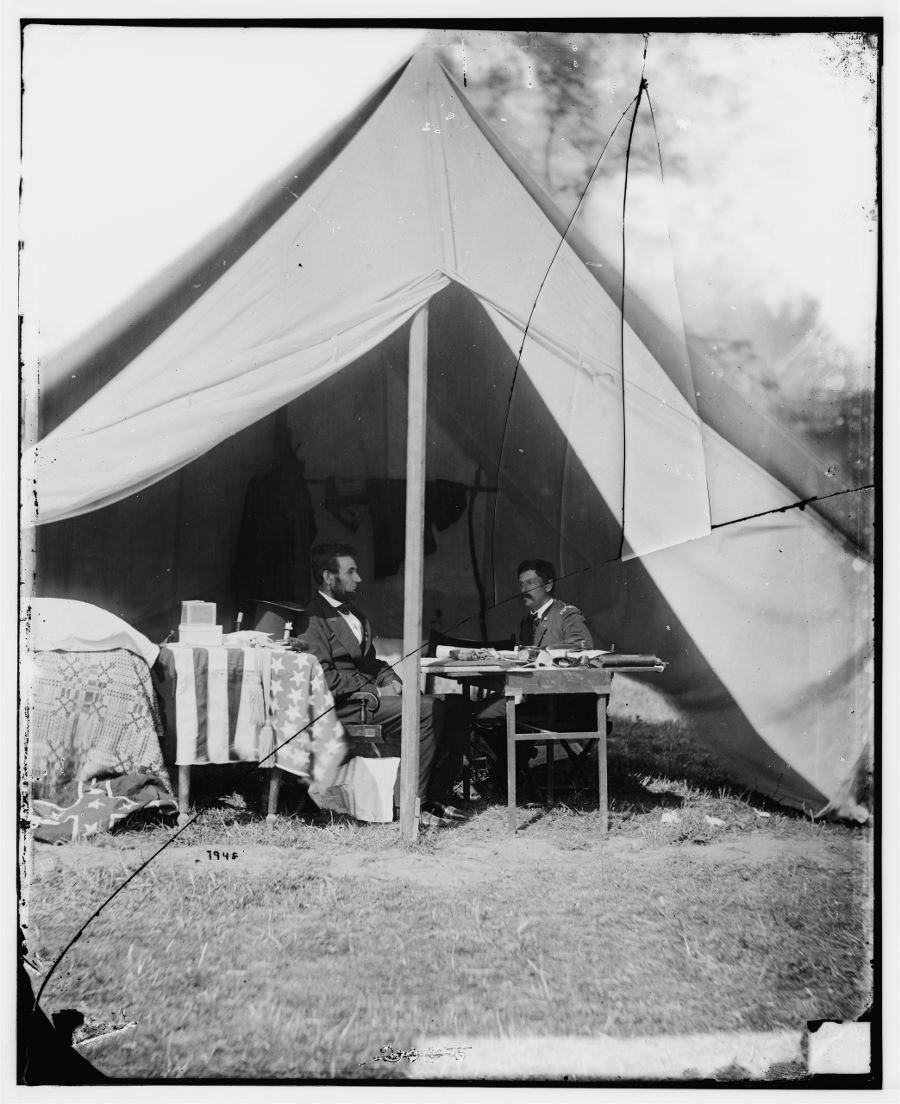
President Lincoln & General George B McClellan in the general’s tent, Antietam Oct 3, 1862.
Also shows the symbolic importance of the two flags as seen here.
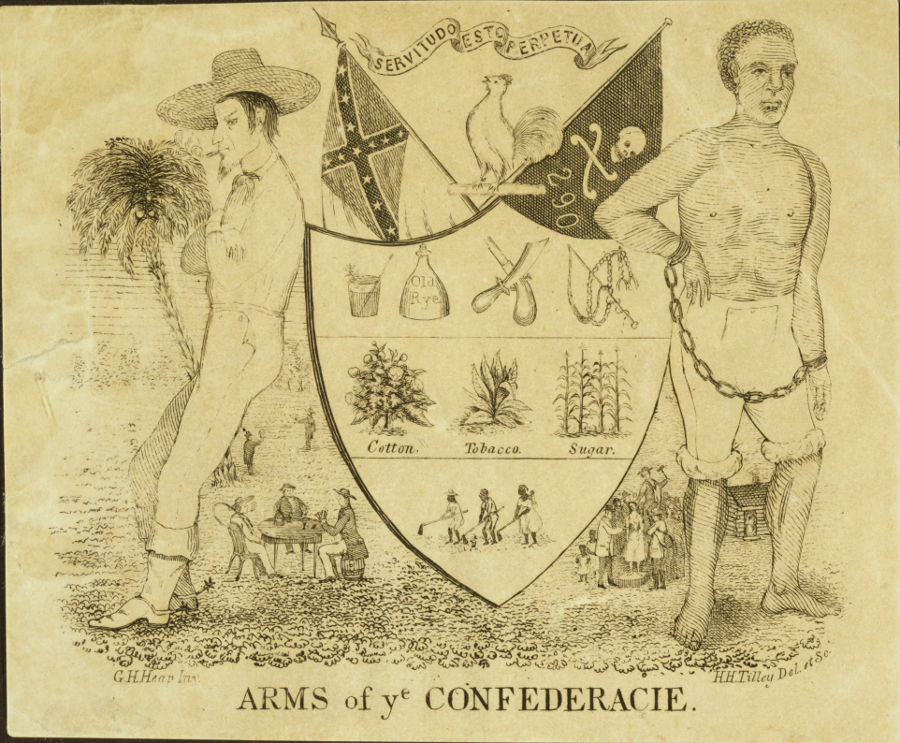
1862 A fake coat of arms bearing a vitriolic indictment of the confederacy.
The artist is clearly attacking the institution of slavery, the foundation of the southern economy. The taunting motto declares “Slavery is for ever” and the illustration compares the lives of the planter and that of the slave.
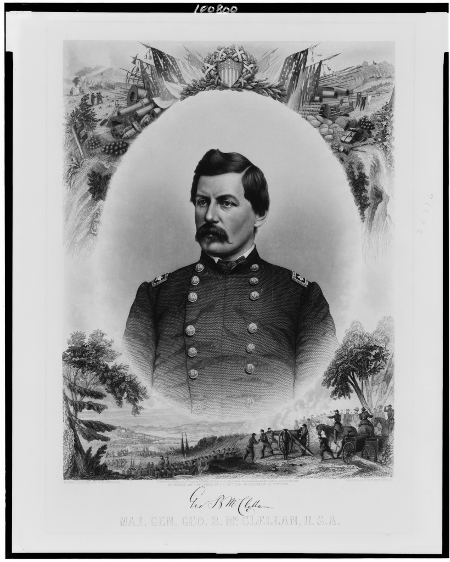
Maj Gen George McClellan
A dignified portrait of the Union Leader who was roundly critiqued for his decisions relating to the Siege of Yorktown.
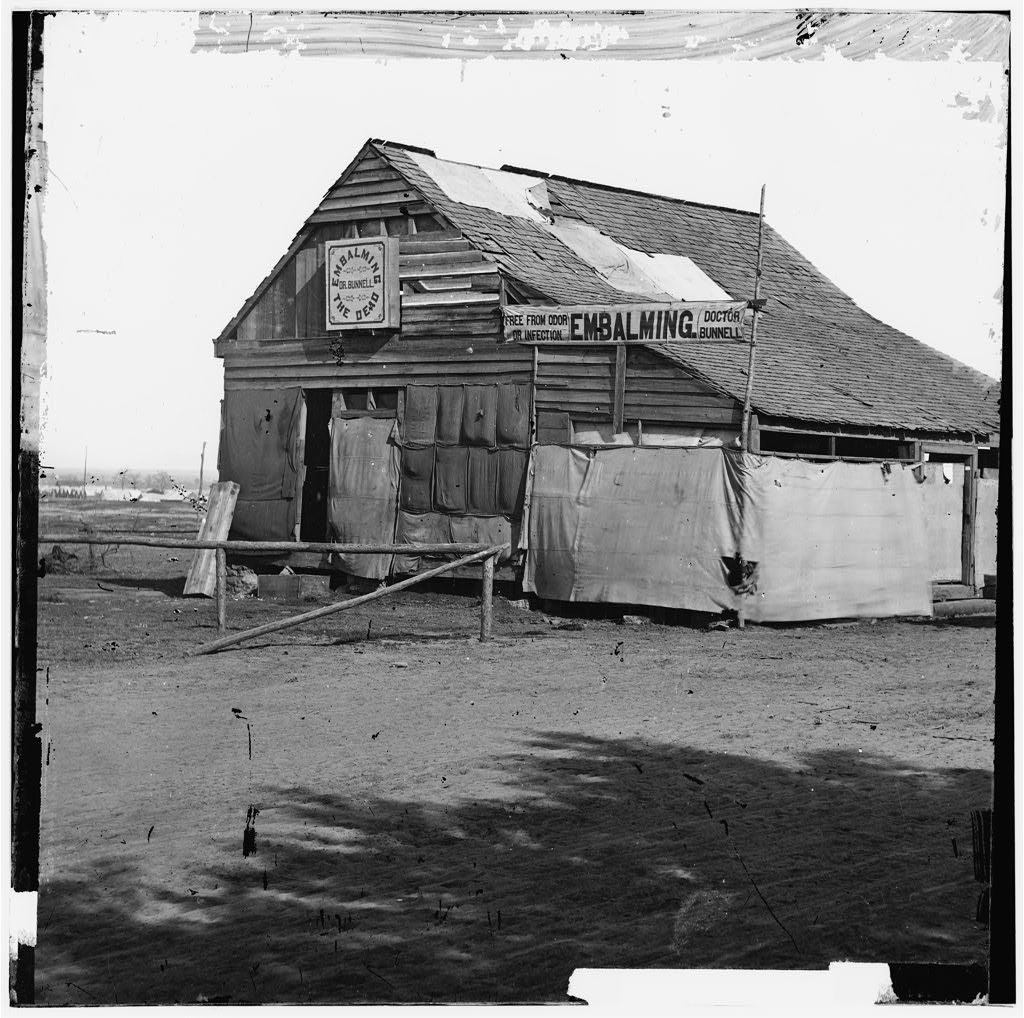
Embalming the dead is a regular business in the American armies in this war.
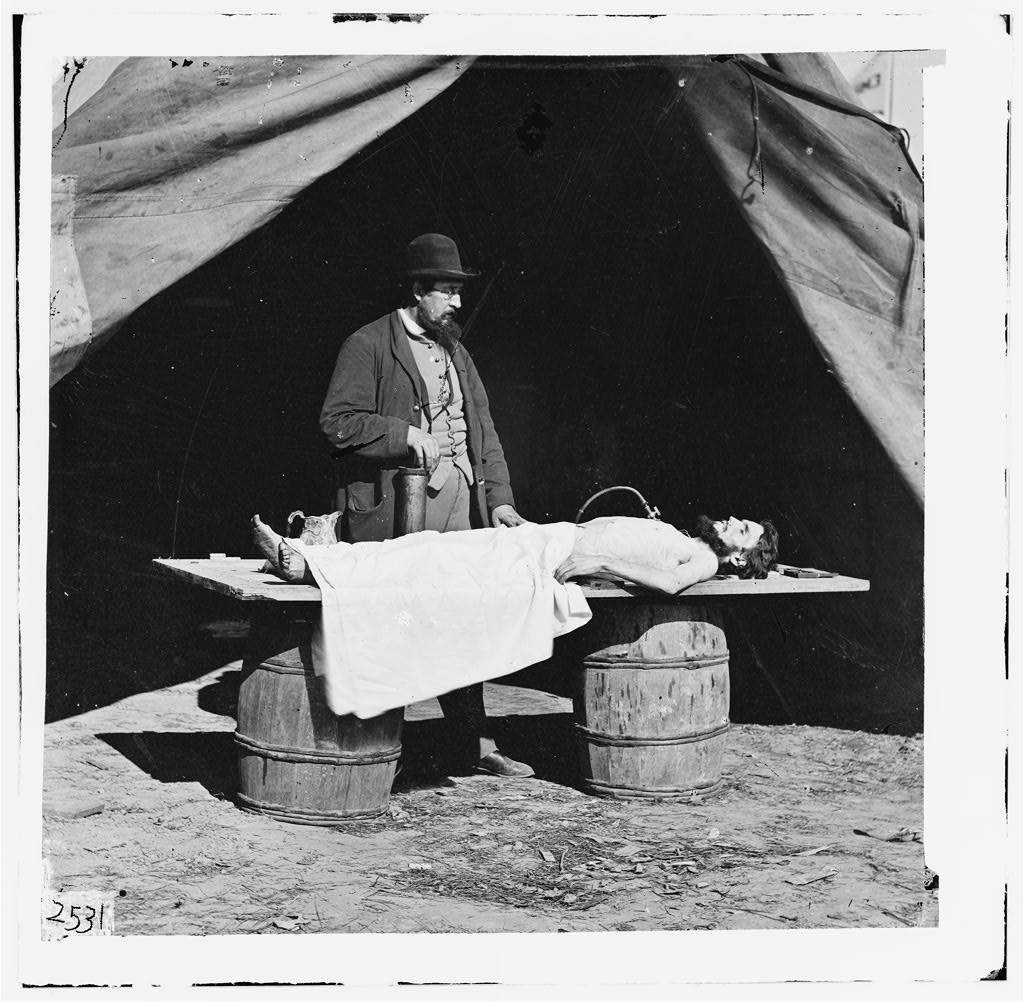
Dr Bunnell’s embalming establishment in the field.
Sources
1. Library of Congress: www.loc.gov/pictures/item/2012649803/
2. Library of Congress: www/loc/gov/pictures/item/2008661644/
3. Library of Congress: www.loc.gov/pictures/item/90714555/
4. Library of Congress: http://loc.gov/pictures/item/cwp2003000055/PP
5. Library of Congress: http://www.loc.gov/pictures/item/cwp2003000144/PP
6. Library of Congress: http://www.loc.gov/pictures/item/cwp2003004872/PP/
7. Source Library of Congress: http://www.loc.gov/pictures/item/cwp2003001042/PP/
Reading October 12. 1862
page 2
brought home to their families & buried here. John Britton was brought on & all hands from the walk attended his funeral. Embalming the dead is a regular business in the American armies in this war. Thousands of bodies are taken home by rail road, some as far as five or six hundred miles, and buried by their relatives & friends in the family grave yards. The meloncholy processions are often seen, with the star spangled banner spread over the coffins. Those sights, and the stories of the thousands of wounded and criples that come back to the north is gradually but surely exasperating the Unionists up to the point of abolishing slavery and arming the blacks against their rebel masters. The traitors have now fair warning; that if they do not lay down their arms by Jany. l. 1863. slavery will be abolished in all rebellious states and districts. They are smarting and cursing under the threat. But I most devoutly pray that they may continue obstinate as ever & in the intrim exasperate the north still more. That is now the only hope for freedom every were [where] in the United states. For then whites and blacks will combine & the slave holder be a slave holder no more. If he does not then submit he will be exterminated root & branch. It is a terrible alternative for the traitors. But it is also a most terrible schooling for the Unionists. They richly deserve it. Without it they would never have given freedom to the slave, nor accorded the common rights of man to the negroes.
I have seen labourers at work in Europe for ten pence a day & living on potatoes & buttermilk, & poorly clad in the coarsest of garments & miserably oppressed every way. Yet, when those same men manage to get to America, & find a class lower still & more degraded than they ever were, they, in 99 cases out of a hundred, join the ultra proslavery party and are as ready to ride rough shod over the poor negro as any body, although they may never be worth half enough to buy a black womans baby. Such is poor human nature.
The history of the white man in America, is one long tale of terrible outrage & murderous cruelty and oppression of other races of men. While constantly prating about his own patriotism, his great love of freedom & the his vast appreciation of his own rights he has been, in the mass, the bloodiest and most unprincebled despot, known in history. When North America was first settled by white men it had a population of about ten millions of red men or Indians as they are called, but no negroes or blacks. As the whites increased & became numerous & powerful, they made war on the red man & tried to reduce him to slavery. But the brave Indian was used to roaming his native forests free, as the game he hunted & prefering death to bondage. So the white man imported the black from Africa. Because the negro is docile, patient, long suffering, more amiable and faithful, than otherwise he (w)could(?)be enslaved. And so he has been increased and multiplied, untill this free nation has four millions of slaves in fifteen states of the union. But the noble and brave indian, loveing liberty dearer than life, has been nearly exterminated. His numbers being reduced from
page 3
ten millions to about five hundred thousand. Most All of this enormous wrong doing has been the work of the slave holders and their especial political friends and allies, the Democrats. Or demogogues I should say. The rank and file of that party are generally honest and believe themselves right. They never know, or believe a hundredth part of the rascality practiced by their leaders and politicians, although it is so plain and so well known to the intelligent and reading portion of the people. But unfortunately in a democracy, that reading thinking, intelligent & reflecting portion of the people are not a majority of the voters. I much fear they never will be.
This fact is well known to all unprincipled & time serving politicians. They found that out in America 60 years ago. They have presumed upon the ignorance and illiberal prejudices of the majority of the people ever since the election of Thomas Jefferson; 3rd president of the united states; in 1800, and it has never deceived their crafty calculations very much since then. True, the most intelligent party have elected three presidents since then, & now the slave power, professing democracy as a sham, has rebelled against the government, because they lost a fair, and legal democratic election. And although it is licking the feet that kick and spurn them & kissing the bloody club that is trying to knock all free & democratic principles on the head, yet our demogogues secretly sympathise with the rebels, and have just succeeded in getting the people of Penna Ohio & Indiana, three large free states, to vote against the war for the restoration of the Union, and in favor of settling the difficulty by forgiving All the traitors all the crimes they have committed, and giving the slave holders all they may arrogantly demand, no matter how extravigant those demands may be; rather than abolish slavery and be just to the negro. The fact is, the great majority of the American people seem disposed to suffer every thing, sacrefice every thing, honour, honesty, reputation, and all safety & Security for their own best rights interests and dearest rights, rather than acknowledge that the poor negro has an equal right to liberty with themselves, or that he has any rights at all they they are bound to respect. But providence will save them from their own errors. God has so hardened the hearts & stiffened the necks of the rebel leaders that they will have nothing less than entire dissolution of the union & disruption of the government, and sooner than grant them that, the free states will be forced to abolish slavery and exterminate the slave holders. Those who think the free states cannot
page 4
do this are greatly mistaken. True, trade here received a stunning blow when this war first broke out. But it has recovered from that entirely now, and is as good as it has been for years. Provisions are plenty & cheap. Work is plenty and men wanted every where. And owing to so many having gone into the army & being otherwise employed by the government in all its various departments, wages are also very high. The commonest labourers get a dollar a day. And such is the demand for miners in the Penna coal mines, that the price of piece work is gone up so high that good miners can earn from 90 to 100 dollars a month (£18 to £20 English) per man. So if you have any colliers to spare around you send them on, for coal has gone up at the mines to double the price it was 18 months ago.
I was in New York only about two weeks ago & could see no difference made by the war, except the number of officers in uniform I saw every where, and regiments going to the armies. All the merchants seemed as busy as ever. The harber was full of vessels. The wharves covered with merchandize. The streets crowded with carts & carriages, waggons, omnibuses & drays as much as ever I saw them, & broad way full as every I saw it. Hotels, eating houses, oyster saloons, lager beer shops, shows, musiums & theaters as crowded as ever. All the watering places & pleasure resorts in the north have been better attended this summer than ever before, although precious few of the southerners were among the visiters.
Such are the wonderful resources of this vast country, that it can maintain a million of men in arms at the war, without any extra suffering to those who remain at home. But it is vastly different in the slave states. The blockade deprives them of nearly all the luxuries and many of the necessaries of life. If they could live on their boasted cotton they might be better off. But they are short of tea coffee, salt sugar & clothing & are cut off from all foreign trade. Much of their lands have been desolated by the war & if their slaves are made unavailable to them they will be in a most sorry plight then.
I must now close. All of the Watsons are well & comfortable. I spent two days at Cousin John’s week before last. His farm is in good order & every thing around him very nice & comfortable. The war dont hurt him much. True, the taxes will be higher. But I think we can stand it awhile any how. Manufacturers are taxed high. My taxes are now £11 or £12 english per month. But we put it all on to the price of the rope. Consumers will have to pay it.
I wish you would write me and say how my brother John and his family were when last you heard of them. I have not heard from him for about three years. With kind regards to you all & hoping to hear from you.
I am
Yours affectionately
Thomas Jackson

Thomas Jackson’s first sentence refers to the article about the slave market that we show as a separate letter from August 12, 1862
Unfamiliar names
The Pioneer was the name of the newspaper in Ilkeston, Derbyshire, England in which Thomas Jackson sought to get his letters published, thereby influencing the readers not to support the Confederacy.
Here are some developments in the war that help to give this letter some perspective:
In July 1861 , the southern confederal forces surprised and humiliated the northern union army at the the first battle of Bull Run. Folk began to realize that this war could go on for a long time
By March1862 naval battles were taking place between ironclad ships, replacing the old flammable wooden ones
By April 1862 General Ulysses Grant won a hard fought battle for the north at Shiloh, Tennessee,
The Rebel forces TJ describes in this letter as moving into Maryland, coming close to Reading, were repulsed by the Union army in The Battle of Antietam, approx. 85 miles northwest of Washington, on September 17, 1862, second only to Gettysburg in importance. On that one day, 23,000 men from both sides were killed. This was less than a month prior to this letter being written. As a point of historical interest, had the Union lost that battle, the British were prepared to recognize the Confederacy.
Thus by now, folks in Reading Pa and elsewhere were well aware that they were being engulfed by a horrible, merciless war.
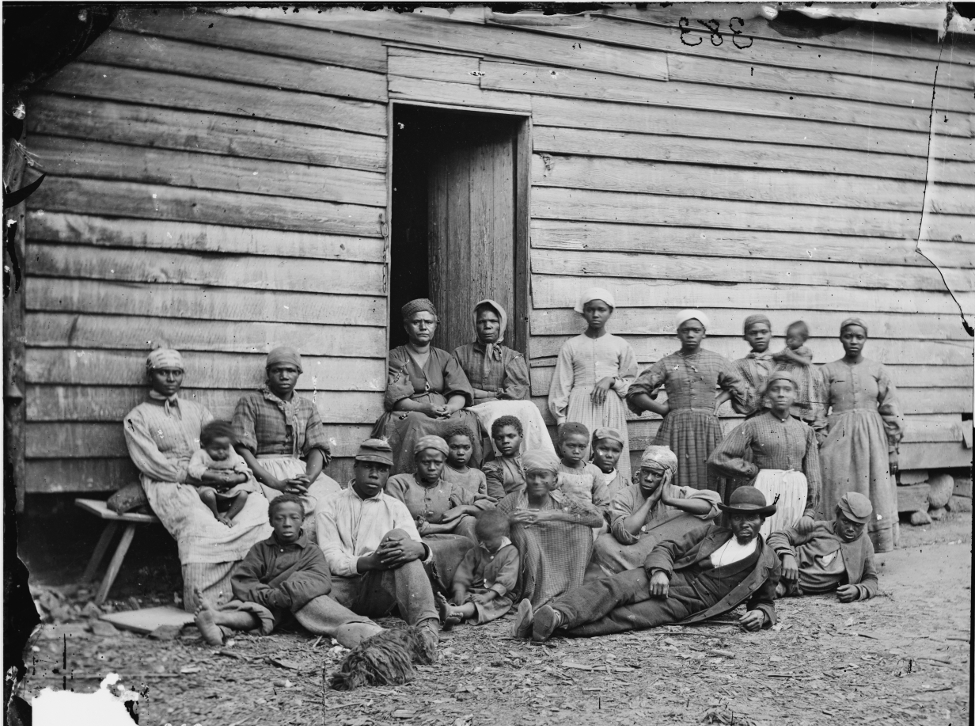
May 1862 . Slaves who had run away were called “Contraband”
From the slave owners’ point of view, slaves who had escaped to freedom had done so illegally, hence were viewed as contraband. The name came to be also used by Northerners including Thomas Jackson too. Here is a group of contraband, photographed at Cumberland Landing, VA.

President Lincoln & General George B McClellan in the general’s tent, Antietam Oct 3, 1862.
Also shows the symbolic importance of the two flags as seen here.

1862 A fake coat of arms bearing a vitriolic indictment of the confederacy.
The artist is clearly attacking the institution of slavery, the foundation of the southern economy. The taunting motto declares “Slavery is for ever” and the illustration compares the lives of the planter and that of the slave.

Maj Gen George McClellan
A dignified portrait of the Union Leader who was roundly critiqued for his decisions relating to the Siege of Yorktown.

Embalming the dead is a regular business in the American armies in this war.

Dr Bunnell’s embalming establishment in the field.
Sources
1. Library of Congress: www.loc.gov/pictures/item/2012649803/
2. Library of Congress: www/loc/gov/pictures/item/2008661644/
3. Library of Congress: www.loc.gov/pictures/item/90714555/
4. Library of Congress: http://loc.gov/pictures/item/cwp2003000055/PP
5. Library of Congress: http://www.loc.gov/pictures/item/cwp2003000144/PP
6. Library of Congress: http://www.loc.gov/pictures/item/cwp2003004872/PP/
7. Source Library of Congress: http://www.loc.gov/pictures/item/cwp2003001042/PP/